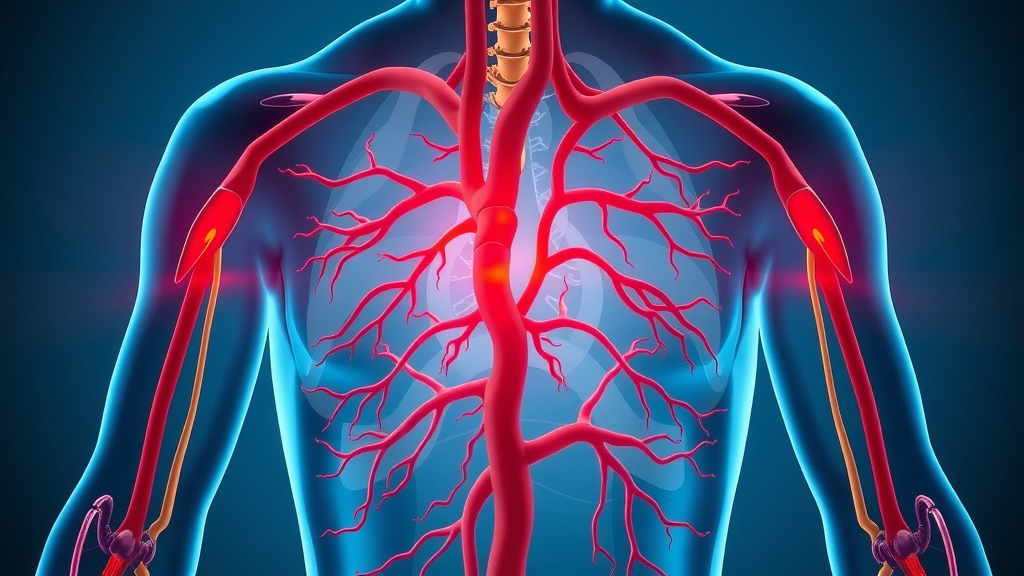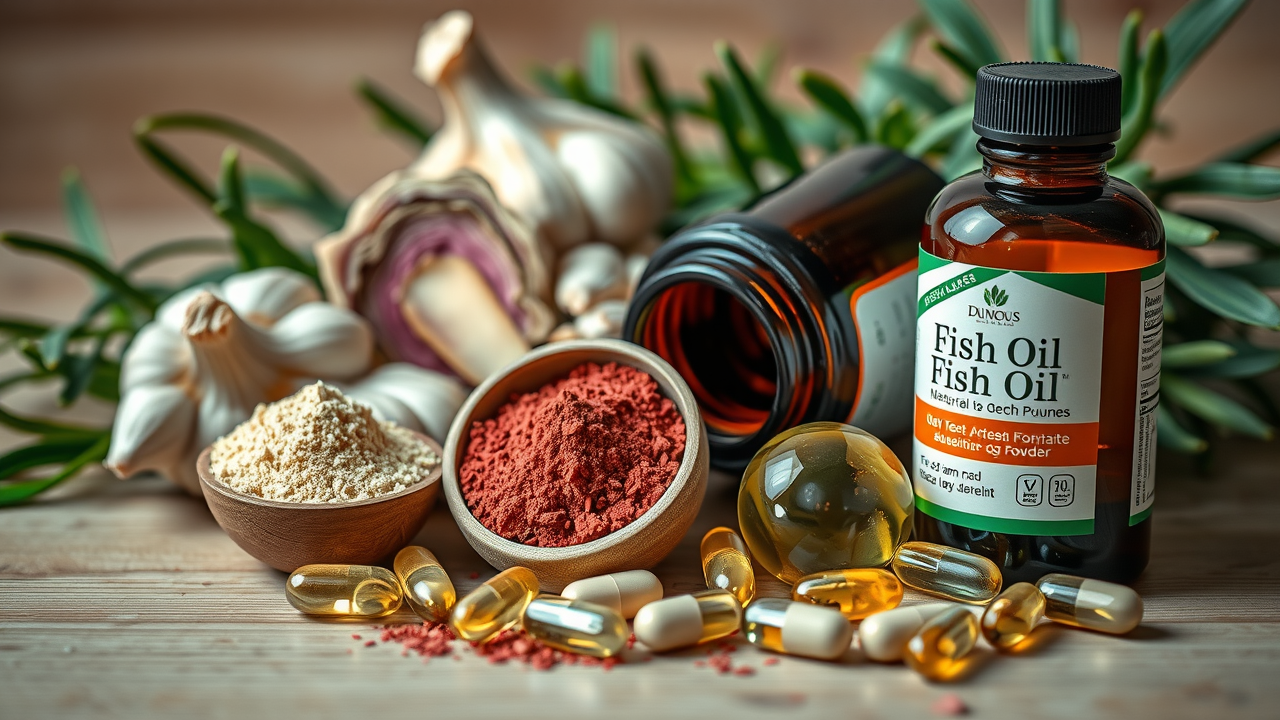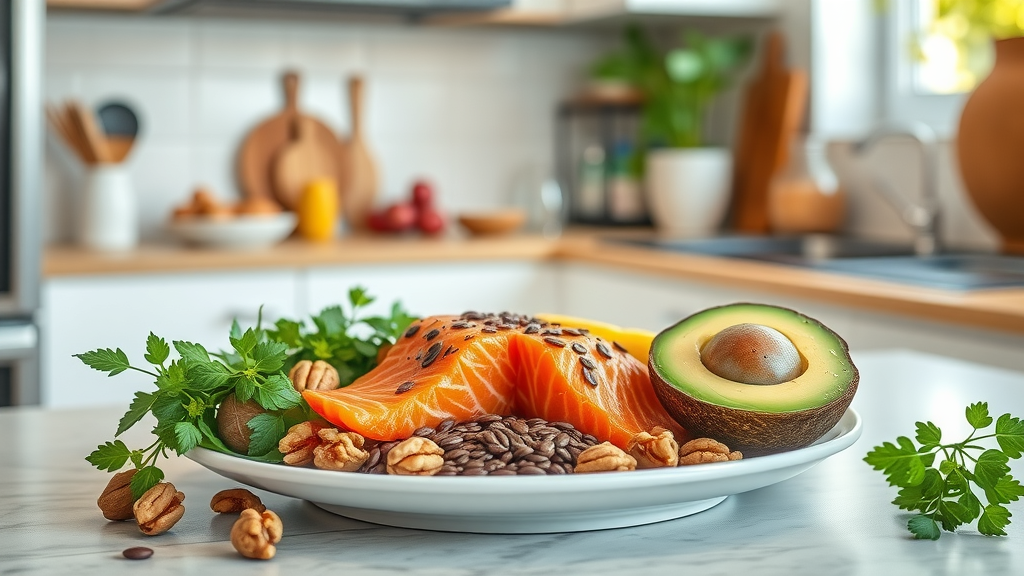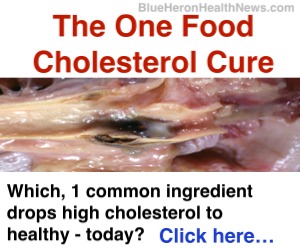Did you know that over 94 million American adults suffer from high cholesterol, a major risk factor for heart disease?
This silent statistic affects every age group and drastically amplifies the risk of heart disease—America’s leading cause of death. Thankfully, emerging research and traditional wisdom have converged to reveal that natural supplements lower cholesterol and offer a powerful, proven pathway toward safer heart health. If you're looking for a reliable alternative to prescription medication or want to amplify your wellness routine, read on to discover how you can reclaim your cardiovascular health naturally.
A Shocking Truth About High Cholesterol and Natural Supplements Lower Cholesterol
Did you know that over 94 million American adults suffer from high cholesterol, a major risk factor for heart disease? Discover how natural supplements lower cholesterol effectively, providing a proven path toward improved heart health and reduced risk of heart disease.

What You'll Learn: The Keys to Using Natural Supplements to Lower Cholesterol
How natural supplements lower cholesterol
The science behind plant sterols and red yeast rice
Proven ways to support heart health
Insights into side effects and safety
Actionable steps for lowering cholesterol naturally
Understanding High Cholesterol: Why Natural Supplements Lower Cholesterol Can Help
High Cholesterol and Its Impact on Heart Health
Definition of high cholesterol
The link between cholesterol levels and heart disease
Overview of cholesterol level guidelines
High cholesterol, particularly when LDL cholesterol ("bad cholesterol") climbs, signals an invisible but significant threat to cardiovascular well-being. Cholesterol—a fatty substance in your blood—is essential in small amounts for hormone production and cell function. However, when there's too much circulating in your bloodstream, it sticks to artery walls forming plaque. Over time, this narrows arteries, making your heart work harder and increasing the risk of a heart attack or stroke . According to medical guidelines, an LDL cholesterol under 100 mg/dL is considered optimal, while levels above 160 mg/dL are categorized as high risk.

The undeniable connection between cholesterol levels and heart disease is supported by decades of research. Unchecked, high cholesterol contributes to a condition known as atherosclerosis, where cholesterol plaques block blood flow to vital organs. This can quietly progress for years, making regular cholesterol checks and early interventions—such as using natural supplements —all the more important. Current guidelines recommend frequent screenings, particularly for adults over 20 or those with a family history of heart disease .

Conventional Treatments vs. Natural Approaches to Lowering Cholesterol
Common prescription options and their side effects
Increasing interest in plant sterol, plant sterols, and natural strategies
Traditional medical strategies for lowering cholesterol primarily involve prescription medications such as statins, fibrates, and bile acid sequestrants, but many seek natural supplements like red yeast rice and plant sterols to avoid side effects. While effective, these drugs are not without side effects : many patients report muscle pain, digestive problems, and in rare cases, liver damage or increased blood sugar. Such drawbacks fuel growing interest in natural supplements that lower cholesterol, such as plant sterols, plant sterols and stanols , and red yeast rice supplements .
For those seeking to avoid or minimize use of prescription drugs, natural approaches offer a promising supplement or alternative. Not only do many supplements provide cholesterol-lowering benefits, but they also boast a smaller side-effect profile and add nutritional value to your diet. Plant-based options—especially red yeast rice , plant sterols , and omega-3 fatty acids —stand out for their robust clinical support and widespread acceptance among both patients and practitioners.
How Natural Supplements Lower Cholesterol: The Evidence-Based Approach
Key Mechanisms: How Natural Supplements Impact Cholesterol Levels
Absorption of cholesterol
Supporting cholesterol level balance
Boosting heart health with fatty acids and sterols and stanols
Natural supplements lower cholesterol through several unique mechanisms, including the action of plant sterols, red yeast rice, and omega-3 fatty acids that support heart health. One common action is reducing the absorption of dietary cholesterol in the gut, thanks to compounds such as plant sterols and stanols . These mimic cholesterol’s structure, blocking its entry into the bloodstream and thus helping to lower LDL , or "bad," cholesterol. Other supplements, such as red yeast rice , contain natural statin-like substances that curb cholesterol production in the liver.
Beyond absorption, some supplements actively help balance cholesterol levels . Omega-3 fatty acids from fish oil or flaxseed, for example, target blood triglycerides, another harmful fat. By lowering both cholesterol and triglycerides, these heart-healthy fats foster improved vascular function and significantly reduce the risk of heart disease . Incorporating a balanced blend of these natural compounds can provide a holistic effect, supporting overall heart health and longevity.
Clinical Research: Effectiveness of Red Yeast Rice and Plant Sterols
Review of clinical trials on red yeast rice and plant sterols
Evidence for reducing cholesterol levels
Statistics on risk of heart disease reduction
Clinical studies show that supplements such as red yeast rice and plant sterols significantly improve cholesterol levels and contribute to reducing the risk of heart disease. Numerous randomized clinical trials report that individuals taking red yeast rice experienced up to a 20% drop in total cholesterol levels after several weeks of use—results close to prescription statins. Data also highlights that plant sterols and stanols , especially when consumed with meals, block cholesterol absorption and can reduce LDL cholesterol by 6-15%.
The evidence goes beyond just lab values. Analysis from large population studies finds that lowering total and LDL cholesterol via these supplements also leads to a measurable decrease in the risk of heart attack and other cardiovascular events . While exact benefits depend on lifestyle variables and genetics, most researchers now agree that red yeast rice, plant sterols, and omega-3 fatty acids play a beneficial role in reducing cholesterol and improving heart health .
Exploring the Best Natural Supplements to Lower Cholesterol
Red Yeast Rice: Potency and Precautions
Active compounds in red yeast rice
How red yeast lowers high cholesterol
Potential side effects and FDA guidance
Red yeast rice , a traditional Asian dietary staple, has become a frontline natural remedy for high cholesterol . This supplement is made by fermenting rice with the Monascus purpureus yeast, resulting in a deep red tint and the creation of monacolins—compounds with cholesterol-lowering properties similar to prescription statins. The most potent is monacolin K, nearly identical to lovastatin, which inhibits hepatic cholesterol synthesis and helps lower LDL cholesterol .
While red yeast rice supplements consistently show promise in reducing total cholesterol and LDL levels, consumers should proceed with caution. Because the active ingredient functions like statins, users may also experience similar side effects : muscle aches, digestive discomfort, or, rarely, liver issues. The FDA has cautioned against certain unregulated supplements due to potential safety concerns and variable monacolin content. Always choose verified brands and consult your healthcare provider before starting any new cholesterol-lowering supplement.

Plant Sterols and Stanols: Blocking Cholesterol Absorption
Sources of plant sterols
Mechanism for inhibiting cholesterol level rise
Recommended daily intake for lowering cholesterol
Plant sterols and stanols, natural compounds found in fruits, vegetables, nuts, and whole grains, effectively lower cholesterol levels by blocking absorption in the digestive tract. Their cholesterol-lowering ability lies in their unique structure, which is similar enough to cholesterol that they compete for absorption in the digestive tract. As a result, less dietary and bile-derived cholesterol is absorbed into the bloodstream—supporting a direct reduction in LDL cholesterol and favorable impact on sterol levels .
The value of plant sterol and stanol supplementation is backed by robust clinical evidence. Most experts recommend a daily intake of 2 grams, typically achieved by consuming enriched food products or high-quality supplements. Regular use, especially combined with a plant-forward diet, has been shown to lower cholesterol without major side effects , making these natural compounds an excellent choice for individuals seeking to lower cholesterol naturally .
Omega-3 Fatty Acids: Heart Health Support
Sources of omega-3 fatty acids
Talent for improving cholesterol levels
Role in reducing risk of heart disease
Omega-3 fatty acids are widely recognized for lowering triglyceride levels and enhancing heart health by improving cholesterol balance and reducing the risk of heart disease . Rich sources include fatty fish (like salmon, mackerel, and sardines), flaxseeds, chia seeds, walnuts, and top-tier fish oil supplements. Omega-3s don’t significantly lower LDL cholesterol, but they substantially improve overall cardiovascular function and can reduce the risk of heart disease and fatal heart attack.
Research regularly links high omega-3 intake with improved blood vessel function, decreased inflammation, and improved heart rhythm stability. Studies also show modest decreases in total cholesterol and better balance among cholesterol fractions, creating a friendlier ratio between HDL ("good") and LDL cholesterol. Incorporating omega-3-rich foods or dietary supplements offers a well-documented pathway toward optimizing heart health while keeping side effects minimal.

Other Natural Compounds: Fiber, Garlic, Artichoke, and More
How dietary fiber aids in lowering cholesterol
Garlic and artichoke extract results
Safety of combining natural supplements
Soluble dietary fiber , abundantly found in oats, legumes, apples, and psyllium, acts as a sponge to bind cholesterol in the digestive tract and help remove it from the body. Incorporating at least 5–10 grams of soluble fiber daily supports reductions in total and LDL cholesterol, and is also beneficial for blood sugar and digestive health.
Other compounds such as garlic and artichoke extract have also made headlines for their cholesterol-lowering potential. While the effect sizes are generally smaller than those seen with red yeast rice or plant sterols , consuming these alongside a healthy diet may produce synergistic benefits. When integrating multiple dietary supplements, it is essential to work with a healthcare provider to ensure safety and proper monitoring.
Comparing Natural Supplements: Which Is Best for Heart Health?
Supplement |
Cholesterol-Lowering Efficacy |
Common Side Effects |
Approximate Price Range |
|---|---|---|---|
Red Yeast Rice |
10–20% LDL reduction; clinical support |
Muscle pain, digestive upset, potential liver issues |
$20–$40/month |
Plant Sterols/Stanols |
6–15% LDL reduction; excellent safety |
Rare digestive upset at high intakes |
$15–$30/month |
Omega-3 Fatty Acids |
Major triglyceride lowering; slight LDL lowering; heart health support |
Reflux, minor digestive upset |
$20–$40/month |
Dietary Fiber |
2–10% LDL reduction; many secondary benefits |
Bloating, gas (initially) |
$10–$25/month |
Risks and Side Effects: What to Know About Natural Supplements Lower Cholesterol
Common side effects of red yeast rice, plant sterols, omega-3 fatty acids
Drug-supplement interactions
Understanding when to consult a healthcare provider
While natural supplements lower cholesterol effectively for many individuals, they may cause side effects and interact with medications, so understanding risks and consulting healthcare providers is essential. Red yeast rice may produce muscle aches or, rarely, liver problems similar to statins; plant sterols and stanols rarely cause digestive upset at very high doses. Omega-3 fatty acids can prompt mild nausea or a fishy aftertaste. Importantly, combining these supplements with prescription medications (especially statins or blood thinners) can increase the risk of interactions or side effects.
It's crucial to discuss any new dietary supplement with your healthcare provider, especially if you have multiple health conditions or take other medications. This proactive approach ensures safety and maximizes the effectiveness of your cholesterol-lowering efforts, all while helping to identify any potential side effects or complications early on.
"While natural supplements lower cholesterol effectively for many individuals, they should always be used in consultation with a healthcare professional." — Dr. Maya Fields, Cardiologist
Best Practices for Taking Natural Supplements to Lower Cholesterol
How to safely incorporate supplements into your routine
Monitoring your cholesterol levels and sterol levels
Lifestyle and dietary changes to amplify benefits
For best outcomes, begin with a single, well-studied supplement such as plant sterols , red yeast rice , or omega-3 fatty acids , based on your cholesterol profile and medical history. Monitor your progress closely with periodic cholesterol level and sterol levels checks, especially after every 8–12 weeks of consistent use. Avoid exceeding manufacturer dosing and always check for third-party quality certification.
Amplify results by integrating lifestyle choices that naturally support healthy cholesterol: prioritize a diet rich in unprocessed plants, whole grains, and soluble fiber; avoid excessive saturated fat; and maintain a regular exercise routine. Collaboration with your healthcare provider or registered dietitian can further tailor your plan and increase your chance of success in lowering cholesterol naturally.
Key List: Top Habits for Improving Cholesterol Levels
Regular use of natural supplements as recommended by your doctor
Maintaining a plant-rich diet high in fiber and low in saturated fat
Staying physically active —aim for at least 150 minutes of moderate exercise weekly
Regular cholesterol level checks to monitor progress and make timely adjustments

Real-World Results: How Natural Supplements Lower Cholesterol for Individuals
Success Stories: Lower Cholesterol and Boost Heart Health
Case studies featuring individuals who used red yeast, plant sterols, and other supplements to manage cholesterol levels; Tips for ongoing success
Meet Margaret, age 66: After struggling with high cholesterol for years despite medication, she added plant sterols and a daily fiber supplement to her routine. Within six months, her LDL cholesterol plunged by 18%, and her doctor reduced her statin dose by half.
Or John, a 72-year-old retiree who was unable to tolerate statins due to side effects: He found success with red yeast rice supplements and minor dietary changes, achieving a 16% drop in LDL cholesterol after a year—without muscle aches or digestive upset.
For many, combining natural supplements with healthy lifestyle habits not only delivers measurable improvements in cholesterol values but also enhances their overall sense of wellness and energy. Consistency, medical guidance, and ongoing monitoring are the keys to lasting success.

People Also Ask: What is the best natural supplement for lowering cholesterol?
Insight into effectiveness of various natural supplements: red yeast rice, plant sterols, and omega-3s for lowering cholesterol
The best natural supplement for lowering cholesterol depends on your unique health profile, cholesterol type, and personal tolerance. Red yeast rice is often recommended for those with significantly high LDL cholesterol who can't take statin drugs. Plant sterols and stanols offer excellent, proven benefits for mild to moderate cholesterol elevations and come with minimal side effects. Omega-3 fatty acids , while primarily targeting triglyceride levels, help round out a cholesterol-lowering regimen and enhance overall heart health. Consulting your healthcare provider is crucial to determine the best approach for you.
Best Options for Lowering Cholesterol Naturally
For most individuals with high cholesterol , starting with plant sterols or red yeast rice delivers the most reliable reductions in LDL, while omega-3 fatty acids and dietary fiber further amplify heart protection. Choosing a high-quality supplement and combining it with healthy food choices represents a smart, science-backed way to lower your cholesterol naturally .
FAQ Section: Choosing and Using Natural Supplements for Cholesterol
Are natural supplements safe for everyone?
While generally safe, natural supplements may not be appropriate for everyone. People with chronic illnesses, liver disease, or those taking certain prescriptions should seek medical advice before starting.
Are there interactions with statins or other drugs?
Yes, especially with red yeast rice and statins, as both lower cholesterol similarly. Always consult with a healthcare provider to avoid potential complications.
How long before results appear?
Most people see improved cholesterol levels within 8–12 weeks of consistent use. Regular blood tests are essential to track changes and adjust your regimen.
Should I take more than one supplement at a time?
Sometimes yes, but only with medical supervision. Certain combinations can be synergistic, but others might increase risk of side effects or drug interactions.
How do I check for supplement quality and purity?
Look for third-party certifications, such as USP or NSF, on your supplement label. Reputable brands provide quality reports and list active ingredient levels clearly.
Take the First Step Toward Lower Cholesterol and Heart Health With Natural Supplements
Natural supplements can lower cholesterol and bolster your risk of heart disease prevention when used responsibly alongside a healthy lifestyle and clinical guidance.
 Add Element
Add Element  Add Row
Add Row 




Write A Comment